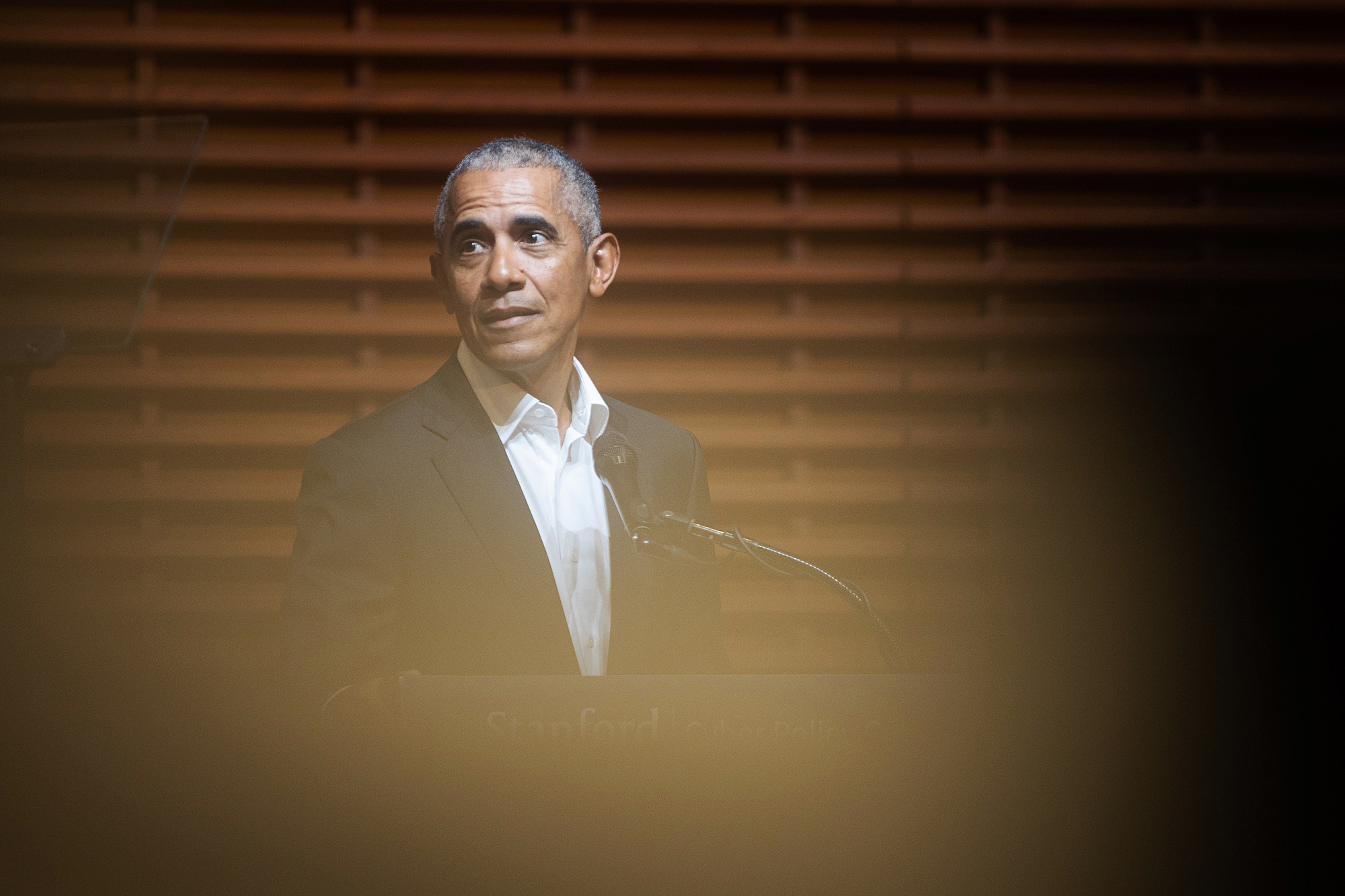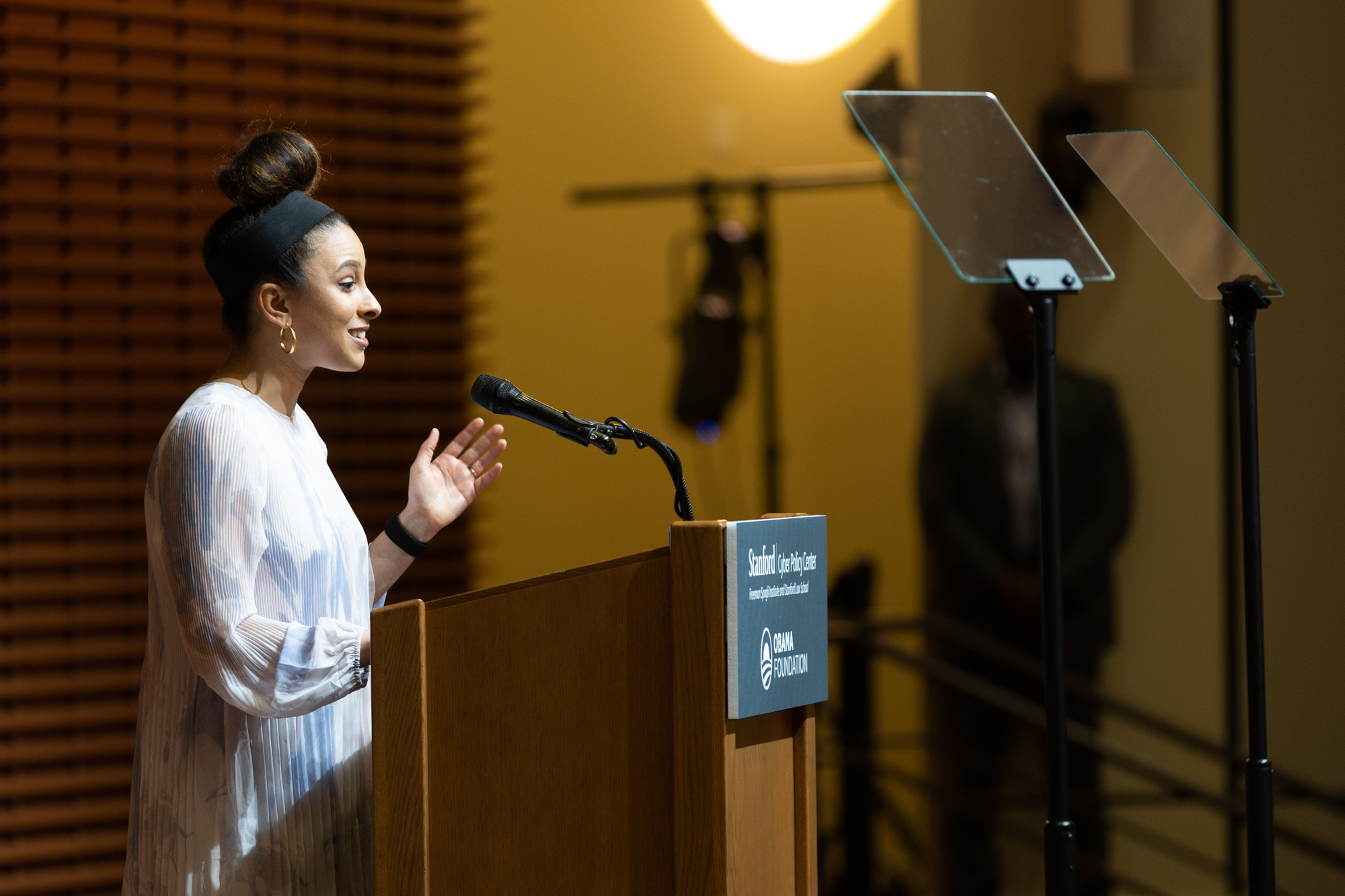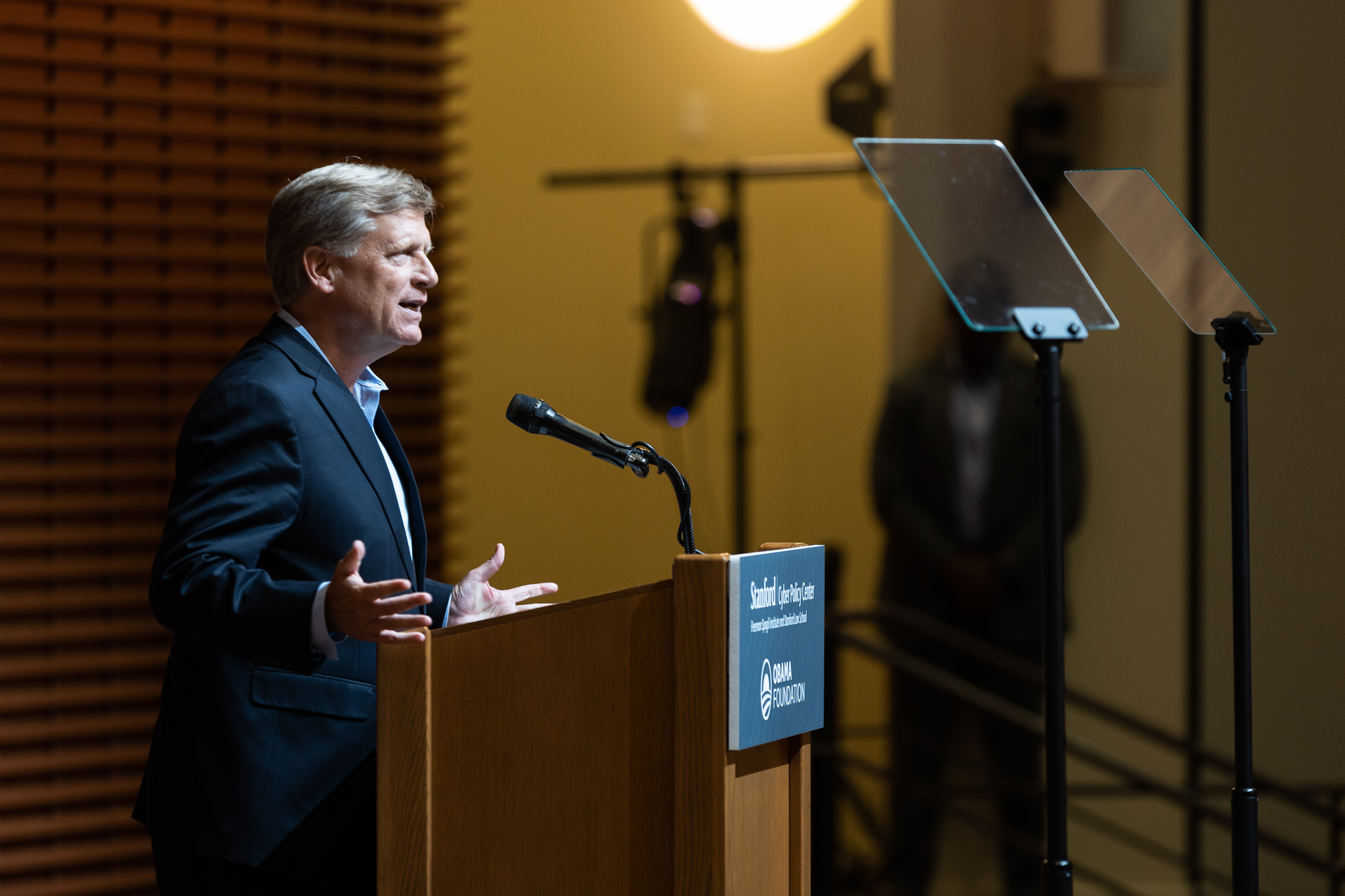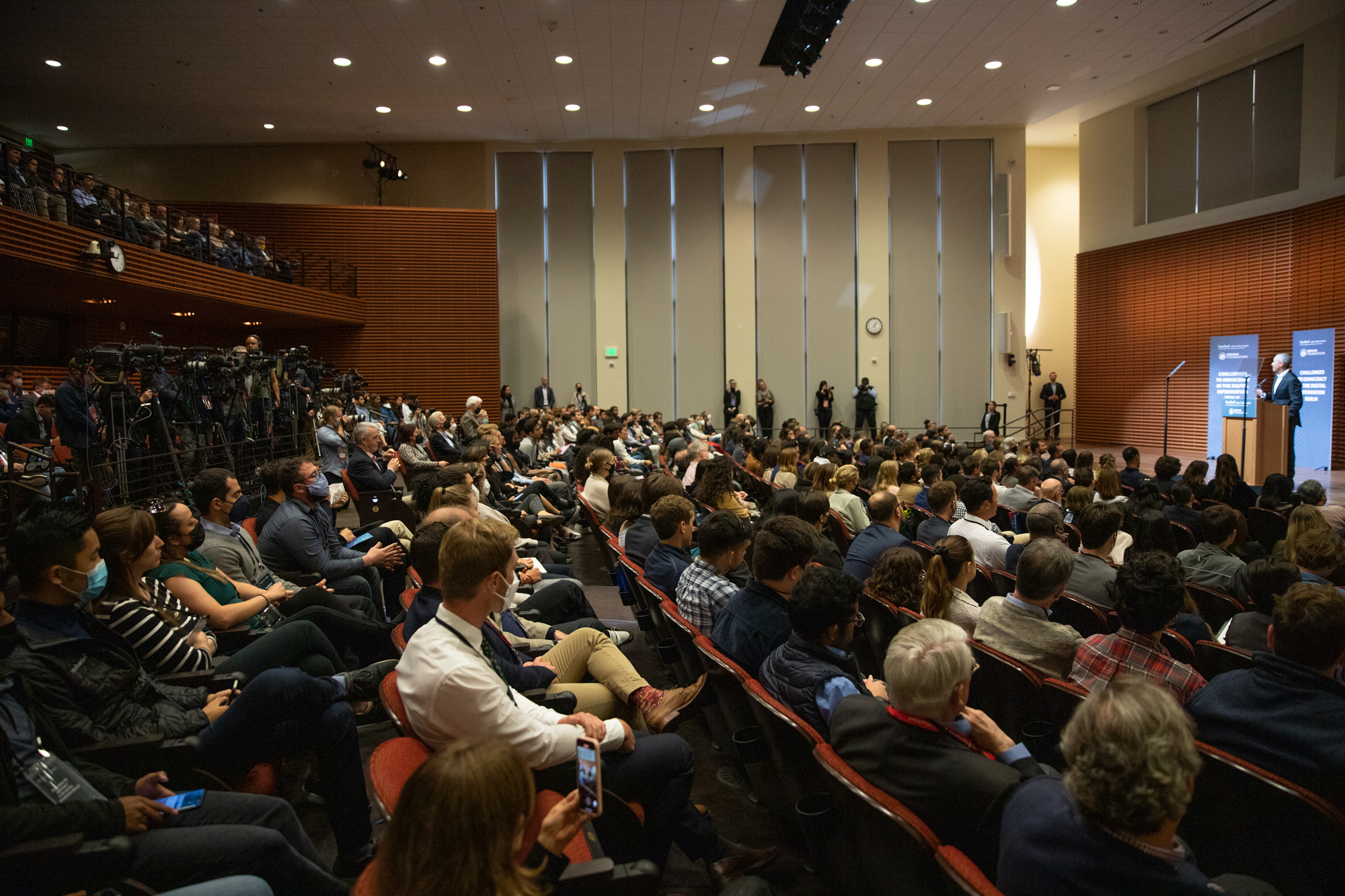Former President Barack Obama came to Stanford University on Thursday to urge tech leaders to take the spirit of innovation that led to Silicon Valley's success and use it to tackle the serious threats to democracy that he sees in the current internet landscape.
In an April 21 keynote address hosted by Stanford's Cyber Policy Center and the Obama Foundation, the former president warned that while technological progress has brought about transformative positive changes, it has also caused disinformation to proliferate and poses profound dangers for democracy.
"Like all advances in technology, this progress has had unintended consequences — it sometimes comes at a price," Obama said. "We see that our new information ecosystem is turbocharging some of humanity's worst impulses."
The former president laid out the case for why he believes tech companies must be part of the solution to improving the internet and why greater government oversight is necessary.
Obama began his speech by taking a broad look at what he described as the tumultuous and dangerous moment in history that the world is currently experiencing. From Russian President Vladimir Putin's invasion of Ukraine to former President Donald Trump's refusal to accept the results of the 2020 election, Obama said that efforts to subvert democracy are underway around the globe.
A major impediment to turning the tide and strengthening democracy, Obama said, lies in the digital transformation Silicon Valley has led.
"One of the biggest reasons for democracy's weakening is the profound change that's taken place in how we communicate and consume information," he said.
Obama detailed a range of harms that he said have come from the shift to the internet as people's primary source of information, including highly personalized news feeds that reinforce people's existing biases, increased difficulty in differentiating factual information from conspiracy theories, the accelerated decline of traditional media outlets and the ability for autocratic leaders to use social media to spread propaganda and hateful messages.
Emerging tools in artificial intelligence, like "deepfake" technology that can create fabricated videos, will allow disinformation to grow more sophisticated and pose frightening implications for our social order, Obama said.
"Fortunately, I am convinced that it is possible to preserve the transformative power and promise of the open internet, while at least mitigating the worst of its harms," he said.
Making the needed fixes will require those working in the technology sector to get involved and take responsibility for the impact of the platforms they have created, Obama said. Tech companies have to go further to limit and slow the spread of dangerous content online, he said.
Decisions also shouldn't be left solely to private companies, Obama told the crowd, but rather ought to be subject to regulation and public oversight, similar to the safety rules in place for other industries. Greater transparency and scrutiny are particularly needed around the algorithms tech giants use to determine what content users see, he said.
The former president argued that these types of regulations aren't mutually exclusive with innovation and can be crafted in ways that protect a company's sensitive business information.
"If a meat packing company has a proprietary technique to keep our hot dogs fresh and clean, they don't have to reveal to the world what that technique is, (but) they do have to tell the meat inspector," Obama said. "In the same way, tech companies should be able to protect their intellectual property while also following certain safety standards that we as a country, not just them, have agreed are necessary for the greater good."
While pushing for major changes to internet oversight, Obama caveated that the goal shouldn't be to try to remove every last bit of offensive material and said that he knows rules for what content is allowed online will have to involve value judgments.
Free speech is important, Obama told the audience, and a robust, even sometimes antagonistic exchange of ideas, creates a better society. At the same time, he pointed out that the first amendment only constrains government action, not the choices of private companies, and that social media sites already make decisions about what content is allowed and how it will appear on their platforms.
In evaluating any proposal to reform social media or the internet more broadly, the former president said his guiding principle will be to consider whether it strengthens or weakens the potential of a healthy and inclusive democracy.
"Whatever changes contribute to that vision, I'm for. Whatever erodes that vision, I'm against," Obama said.
Beyond tech companies and lawmakers, Obama said individuals should also work to broaden the views and perspectives they see and to learn how to better fact-check the information they consume online.
The prospect of creating a better version of the internet is a challenge that everyone should collectively welcome, Obama argued, and one that has the potential to create a better world.
"Now's the time to pick a side," Obama said. "We have a choice right now. Do we allow our democracy to wither or do we make it better? That's the choice we face and it is a choice worth embracing."






Comments
Registered user
Monta Loma
on Apr 22, 2022 at 2:26 pm
Registered user
on Apr 22, 2022 at 2:26 pm
Free speech and information is required for free Democracy. Limiting its freedom and accessibility makes Democracy less free. Should the government curate what information is freely available to you? I prefer not.
Registered user
Cuesta Park
on Apr 22, 2022 at 2:33 pm
Registered user
on Apr 22, 2022 at 2:33 pm
"In [an] address hosted by Stanford's Cyber Policy Center and the Obama Foundation, [Obama] warned that ... technological progress ... has also caused disinformation to proliferate and poses profound dangers for democracy."
I ask you: WHO exactly decides what is "information" and what is "disinformation"? UNTIL we get that question answered, encouraging tech companies to CENSOR "disinformation" will merely result in CENSORING NEWS STORIES that are politically inconvenient to persons in power, which is A TERRIBLE IDEA that smacks of ORWELLIAN dystopia.
Consider the difference between Fox News and CNN/MSNBC. Which one would you choose to arbitrate what is Truth and what is not? Which one should be censored? I submit that Dems and Republicans will answer differently. EACH wants the other SILENCED, because of course they do.
Consider: in 2016, an organization called WikiLeaks published a large set of emails that showed that the DNC had not run a "free and fair" primary involving Hillary Clinton and Bernie Sanders. What WL published was "INFORMATION," the emails had electronic signatures, none of them were ever shown to be false in any way.
However, a "DISINFORMATION" campaign called Russia-gate emerged with a concocted story that Russia had stolen the emails via a cyber-attack, and given them to WL in order to put Trump in office. But the DNC NEVER turned over the attacked machines for the FBI to properly investigate? WHY NOT???!
"CrowdStrike, the private cyber-security firm that first accused Russia of hacking Democratic Party emails and served as a critical source for U.S. intelligence officials in the years-long Trump-Russia probe, acknowledged to Congress more than two years ago that it had no concrete evidence that Russian hackers stole emails from the [DNC]’s server."- Web Link
Propaganda surrounds us.
Registered user
Blossom Valley
on Apr 22, 2022 at 3:07 pm
Registered user
on Apr 22, 2022 at 3:07 pm
While I’m not for censorship, the distribution of misinformation and lies are rampant on the Internet. Perhaps that would change if users were NOT permitted to post anonymously.